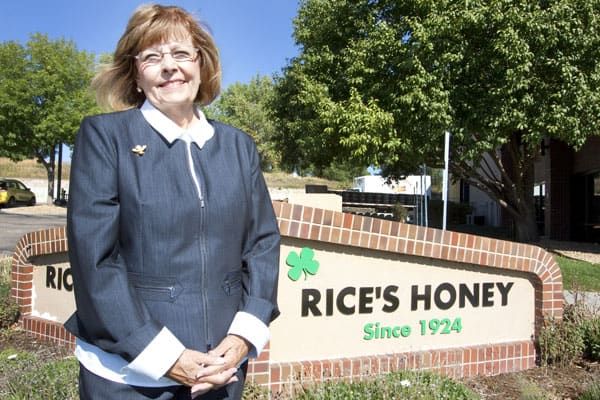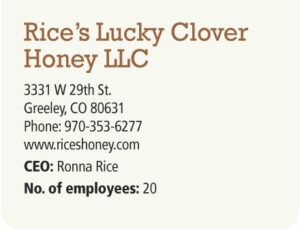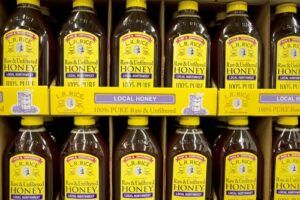Biz buzzing for Rice’s Lucky Clover Honey

 GREELEY — You can catch a lot of flies with honey, but apparently you can also build a family business more than likely to last a century, as well.
GREELEY — You can catch a lot of flies with honey, but apparently you can also build a family business more than likely to last a century, as well.
At least that’s the case with Rice’s Lucky Clover Honey LLC, based in Greeley, which has been serving up honey … well, since founder L.C. Rice began carting it around town in 1924. While it may not be the fastest-growing industry in the world — you simply can’t plant or manufacture honeybees — Rice’s Honey has become an international brand over the last decade, while also finding its way back to its roots, as well.
“We’ve got a pretty good national distribution footprint,” said Tony Landretti, who might be known as marketing director at any other company. Here he is just one of the family, along with some actual fifth-generation family members, or perhaps, like everyone else, “chief cook and bottle-washer.”
SPONSORED CONTENT
“We export to South Korea and Japan, and we’re just starting to get into China. We’re also looking at getting into Singapore.”
So how does a 20-person, family-friendly firm get around so well? Well, nationally it’s giving people what they want, and 100 percent pure, natural unfiltered honey that comes from local sources is what a lot of people are looking for these days.
“We actually work with different beekeepers across the United States,” Landretti said. “From those, we create these different local varieties (which are filtered, packaged and sent back to distributors). What we really focus on is providing a pure, natural product at a very fair price.”

An interesting part of the honey business, apparently is that hardly any of the product produced in the United States can be considered “organic,” though it is pretty hard to say that anything a honeybee can create would be less than organic. But without going into the legalese of organic labeling, suffice it to say that while there’s a few boutique producers outside of the U.S. — which can charge more than $2 per ounce — the bulk of the honey business lies in domestically produced product.
Rice’s does produce specialty products, such as “clover” and “Local Colorado” or “Local Texas Wildflower” brands, which are flavored by the bulk of the pollen bees collect.
Creating more boutique products — such as an orange blossom brand — may be achievable for small producers, but certainly not in the quantities needed to keep prices competitive with larger honey producers. Either that, or it would simply be misleading, Landretti said.
“The most common nomenclature is clover, and almost all of our clover honey comes from Montana and North Dakota,” he said. “There’s no way of knowing, other than measuring pollen counts, what pollen is in the honey, and beekeepers often get the naming of their own honey wrong.
“But when we put a name on it, you are going to get high 80s or 90s (percentage of the named pollen).”
A more large-scale method of producing packaged honey is through high-pressure filtration, but that does not allow for the pollen to flavor the honey.
“That takes away the DNA of the honey in its natural state; you lose that pollen,” Landretti said. “When we run it through the cheesecloth, you are just removing the dirt and the bee’s knees. All the natural pollens and enzymes will still flow through.”
Still, Rice’s honey is very much competitive with most honey manufacturers — coming in at less than $7 for a 16-ounce bottle — and is sold at most all major groceries. This honey appears under the L.C. Rice brand. A similar, though slightly more expensive, brand — Rice Family Honey — is sold through whole and natural brand distributorships and is found at outlets such as Alfalfa’s and Whole Foods.
“I think consumers are very interested in organic honey, and I think there some switching going on in the U.S.A., but what we focus on is U.S.-only raw honey,” Landretti said.
Ronna Rice — who married Jim Rice, the grandson of L.C. Rice, at age 18 — is the CEO of the company, but half of the staff is either directly or closely related to the man who peddled honey around in a pull cart back in 1924. “But, really, they treat everyone around here like family,” said Landretti, who has led marketing efforts with major brands such as Quaker and Campbell Soup in the past.
The company sold its own beehives more than a decade ago, but in the last few years has returned to that business, having now acquired about 1,000 hives and selling beekeeping equipment on the side, as well.
While there is one full-time beekeeper, the self-owned hives are more about supporting that vocation, as the production is almost just a drop in the proverbial bucket now. Rice Honey now does presentations at the Butterfly Pavilion and education centers across northeastern Colorado in support of honeybees and beekeeping.
“We started back into beekeeping at the the tail end of last year, and the one thing our beekeeper has been doing is offering classes to educate the hobbyists. One day we’d like to have more than 1,000 hives again — but you can’t just flip that switch and turn it on.”
 GREELEY — You can catch a lot of flies with honey, but apparently you can also build a family business more than likely to last a century, as well.
GREELEY — You can catch a lot of flies with honey, but apparently you can also build a family business more than likely to last a century, as well.
At least that’s the case with Rice’s Lucky Clover Honey LLC, based in Greeley, which has been serving up honey … well, since founder L.C. Rice began carting it around town in 1924. While it may not be the fastest-growing industry in the world — you simply can’t plant or manufacture honeybees — Rice’s Honey has become an international brand…
THIS ARTICLE IS FOR SUBSCRIBERS ONLY
Continue reading for less than $3 per week!
Get a month of award-winning local business news, trends and insights
Access award-winning content today!
